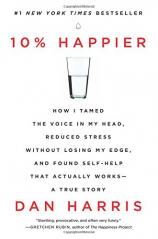Reading Group Guide
Discussion Questions
10% Happier: How I Tamed the Voice in My Head, Reduced Stress Without Losing My Edge, and Found Self-Help That Actually Works—A True Story

1. Dan Harris opens 10% HAPPIER by talking about the destructive chatter of the voice in his head. What is your internal narrator like? Describe your inner voice. How does the voice influence your day and how you react to events?
2. Dan admits that he initially thought mediation was silly, new-agey nonsense. What factors and events change his opinion? Why does he finally attempt meditation, and what led him to fully embrace it? Trace his arc, from before his panic attacks to where he is today. How did meditation help him tame his inner voice?
3. Throughout the book, Harris talks about the ego. “The ego is constantly comparing itself to others.” What is ego? How does ego contribute to our success and our unhappiness?
4. “The pursuit of happiness becomes the source of our unhappiness.” What message is Harris conveying with this sentence? Do you agree? How do you define happiness? Are we a culture that places too much emphasis on being happy? Or are we just going about it the wrong way? What made Dan unhappy in his life? How did meditation help him achieve “10% more happiness?” How could it help you?
5. Meditation is about becoming more mindful. Describe mindfulness and how can it be beneficial. Dan writes that mindfulness is “an alternative to living reactively.” Expand on this statement. How does one live reactively? Were you surprised by the number of mainstream organizations Dan mentions that have adopted meditation?
6. A big part of mindfulness is about being present. Dan admits, “I was a pro at avoiding the present.” Why is it difficult for so many people to be present --- to be in the moment? Take a few minutes with your group to focus on the moment. Share what you are all feeling --- the sensations you experience in your body, the noises you may hear around you, what you notice about the space and the people around you. Dan calls mindfulness a “superpower.” Do you think that it is? Do you believe that mindfulness can change the world?
7. Midway through the book, Dan describes his first retreat. Discuss that experience and what he learned from it. Have you ever been on a retreat, and if not, would you be interested in attending one? Could you go with little conversation and no outside stimulants --- books, television, the Internet --- for a week or two?
8. Dan also discusses compassion and the practice of metta --- loving-kindness meditation. Why is metta initially difficult for him? Consider our society today. Do you think we are lacking in compassion? If so why? Why is the notion of caring sometimes sneered at or dismissed? Have you ever been accused of “caring too much?” Are Americans too cynical today? How do we overcome cynicism? How can we encourage people to become more compassionate? Think about your day. Did you experience any acts of compassion or kindness --- either an act you precipitated or one you received?
9. Dan often talks about being skeptical. Is skepticism a good thing? What is the difference between skepticism and cynicism? When is skepticism productive and when is it negative? How does Dan overcome his skepticism throughout the book, whether to meditation, metta, or the idea of enlightenment itself? What is enlightenment? Think about Buddhism and the period of western history know as the Enlightenment. Are they connected?
10. Were you skeptical about meditation before you read 10% HAPPIER? How did you feel after finishing the book? What influenced your opinion? Dan uses an unscientific but intriguingly doable estimate --- meditation makes his life 10% happier --- to help spread his message about the benefits of meditation to unbelievers. If his message resonates with you, how would you address skeptics to read his book?
11. Throughout the book, Harris mentions various authors he has read, met, and interviewed, including Eckharte Tolle, Deepak Chopra and Joseph Goldstein. Before reading 10% HAPPIER, had you heard of these other authors or read their books? If not, are you interested in exploring their works now?
12. In the preface, Harris writes, “What I’m attempting to do in this book is demystify meditation, and show that if it can work for me, it can probably work for you, too.” Does he succeed? While reading the book --- or having finished it --- have to you tried to meditate? If so, talk about your experiences. If not, discuss what is holding you back.
13. What did you take away from reading 10% HAPPIER?
10% Happier: How I Tamed the Voice in My Head, Reduced Stress Without Losing My Edge, and Found Self-Help That Actually Works—A True Story
- Publication Date: December 30, 2014
- Genres: Mental Health, Mind & Body, Self-Help
- Paperback: 256 pages
- Publisher: Dey Street Books
- ISBN-10: 0062265431
- ISBN-13: 9780062265432








